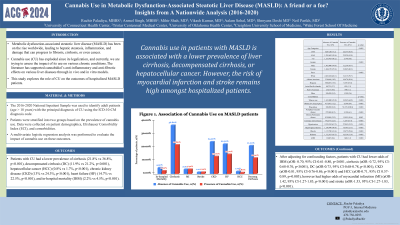Tuesday Poster Session
Category: Liver
P4680 - Cannabis Use in Metabolic Dysfunction-Associated Steatotic Liver Disease (MASLD): A Friend or a Foe? Insights From a Nationwide Analysis (2016-2020)
Tuesday, October 29, 2024
10:30 AM - 4:00 PM ET
Location: Exhibit Hall E

Has Audio

Ruchir Damjibhai Paladiya, MBBS
University of Connecticut Health Center
Hartford, CT
Presenting Author(s)
Ruchir Damjibhai. Paladiya, MBBS1, Anmol Singh, MBBS2, Mihir P. Shah, MD3, Vikash Kumar, MD4, Aalam Sohal, MD5, Shreyans Doshi, MD6, Neil D.. Parikh, MD7
1University of Connecticut Health Center, Hartford, CT; 2Tristar Centennial Medical Center, Nashville, TN; 3John H. Stroger, Jr. Hospital of Cook County, Cook County, IL; 4Creighton University School of Medicine, Brooklyn, NY; 5Creighton University School of Medicine, Seattle, WA; 6Wake Forest University School of Medicine, Charlotte, NC; 7Hartford Hospital, Harford, CT
Introduction: Cannabis use (CU) has exploded since its legalization, and currently, we are trying to assess the impact of its use on various chronic conditions. Metabolic dysfunction-associated steatotic liver disease (MASLD) has been on the rise worldwide, leading to hepatic steatosis, inflammation, and damage that can progress to fibrosis, cirrhosis, or even cancer. The literature has supported cannabidiol’s anti-inflammatory and anti-fibrotic effects on various liver diseases through in vivo and in vitro models. This study explores the role of CU on the outcomes of hospitalized MASLD patients.
Methods: The National Inpatient Sample (NIS) 2016–2020 was used to identify adult patients (age > 18 years) with MASLD using ICD-10 codes. Patients with missing demographics and mortality data were excluded from the study. Patients were stratified into two groups based on the prevalence of cannabis use. Data were collected on patient demographics, Elixhauser Comorbidity Index (ECI), and comorbidities. A multivariate logistic regression analysis was performed to evaluate the impact of CU on these outcomes.
Results: Of the 3,379,484 patients, CU was identified in 52,315 (1.54%) patients. The majority of the CU patients were aged 18-44 years (46.4%), male (59.7%) and white race (59.75). Table 1 shows the prevalence of CU among various comorbidities. Patients with CU had a lower prevalence of cirrhosis (21.8% vs 36.8%, p< 0.001), decompensated cirrhosis (DC) (11.9% vs 21.2%, p< 0.001), hepatocellular cancer (HCC) (0.8% vs 1.7%, p< 0.001), chronic kidney disease (CKD) (13% vs 24.3%, p< 0.001), heart failure (HF) (14.7% vs 22.5%,p< 0.001), and in-hospital mortality (IHM) (2.2% vs 4.5%, p< 0.001). (Figure 1) After adjusting for confounding factors, patients with CU had lower odds of IHM (aOR- 0.70, 95% CI-0.61-0.80, p< 0.001), cirrhosis (aOR- 0.72, 95% CI-0.68-0.76, p< 0.001), DC (aOR-0.73, 95% CI-0.68-0.78, p< 0.001), CKD (aOR-0.81, 95% CI-0.76-0.86, p< 0.001) and HCC (aOR-0.71, 95% CI 0.57-0.89, p=0.003), however had higher odds of myocardial infarction (MI) (aOR-1.42, 95% CI-1.27-1.83, p< 0.001) and stroke (aOR-1.53, 95% CI-1.27-1.83, p< 0.001).
Discussion: Our study highlights that patients with MASLD are associated with lower risk of developing liver related events but higher risk of myocardial infarction and stroke with concomitant CU. Clinical trials involving CBD and monitoring its effects are limited and further research would be valuable to elucidate more mechanisms in regards to these novel findings.

Note: The table for this abstract can be viewed in the ePoster Gallery section of the ACG 2024 ePoster Site or in The American Journal of Gastroenterology's abstract supplement issue, both of which will be available starting October 27, 2024.
Disclosures:
Ruchir Damjibhai. Paladiya, MBBS1, Anmol Singh, MBBS2, Mihir P. Shah, MD3, Vikash Kumar, MD4, Aalam Sohal, MD5, Shreyans Doshi, MD6, Neil D.. Parikh, MD7. P4680 - Cannabis Use in Metabolic Dysfunction-Associated Steatotic Liver Disease (MASLD): A Friend or a Foe? Insights From a Nationwide Analysis (2016-2020), ACG 2024 Annual Scientific Meeting Abstracts. Philadelphia, PA: American College of Gastroenterology.
1University of Connecticut Health Center, Hartford, CT; 2Tristar Centennial Medical Center, Nashville, TN; 3John H. Stroger, Jr. Hospital of Cook County, Cook County, IL; 4Creighton University School of Medicine, Brooklyn, NY; 5Creighton University School of Medicine, Seattle, WA; 6Wake Forest University School of Medicine, Charlotte, NC; 7Hartford Hospital, Harford, CT
Introduction: Cannabis use (CU) has exploded since its legalization, and currently, we are trying to assess the impact of its use on various chronic conditions. Metabolic dysfunction-associated steatotic liver disease (MASLD) has been on the rise worldwide, leading to hepatic steatosis, inflammation, and damage that can progress to fibrosis, cirrhosis, or even cancer. The literature has supported cannabidiol’s anti-inflammatory and anti-fibrotic effects on various liver diseases through in vivo and in vitro models. This study explores the role of CU on the outcomes of hospitalized MASLD patients.
Methods: The National Inpatient Sample (NIS) 2016–2020 was used to identify adult patients (age > 18 years) with MASLD using ICD-10 codes. Patients with missing demographics and mortality data were excluded from the study. Patients were stratified into two groups based on the prevalence of cannabis use. Data were collected on patient demographics, Elixhauser Comorbidity Index (ECI), and comorbidities. A multivariate logistic regression analysis was performed to evaluate the impact of CU on these outcomes.
Results: Of the 3,379,484 patients, CU was identified in 52,315 (1.54%) patients. The majority of the CU patients were aged 18-44 years (46.4%), male (59.7%) and white race (59.75). Table 1 shows the prevalence of CU among various comorbidities. Patients with CU had a lower prevalence of cirrhosis (21.8% vs 36.8%, p< 0.001), decompensated cirrhosis (DC) (11.9% vs 21.2%, p< 0.001), hepatocellular cancer (HCC) (0.8% vs 1.7%, p< 0.001), chronic kidney disease (CKD) (13% vs 24.3%, p< 0.001), heart failure (HF) (14.7% vs 22.5%,p< 0.001), and in-hospital mortality (IHM) (2.2% vs 4.5%, p< 0.001). (Figure 1) After adjusting for confounding factors, patients with CU had lower odds of IHM (aOR- 0.70, 95% CI-0.61-0.80, p< 0.001), cirrhosis (aOR- 0.72, 95% CI-0.68-0.76, p< 0.001), DC (aOR-0.73, 95% CI-0.68-0.78, p< 0.001), CKD (aOR-0.81, 95% CI-0.76-0.86, p< 0.001) and HCC (aOR-0.71, 95% CI 0.57-0.89, p=0.003), however had higher odds of myocardial infarction (MI) (aOR-1.42, 95% CI-1.27-1.83, p< 0.001) and stroke (aOR-1.53, 95% CI-1.27-1.83, p< 0.001).
Discussion: Our study highlights that patients with MASLD are associated with lower risk of developing liver related events but higher risk of myocardial infarction and stroke with concomitant CU. Clinical trials involving CBD and monitoring its effects are limited and further research would be valuable to elucidate more mechanisms in regards to these novel findings.

Figure: Figure 1. Association of Cannabis Use on Metabolic Dysfunction-Associated Steatotic Liver Disease (MASLD) patients.
Note: The table for this abstract can be viewed in the ePoster Gallery section of the ACG 2024 ePoster Site or in The American Journal of Gastroenterology's abstract supplement issue, both of which will be available starting October 27, 2024.
Disclosures:
Ruchir Paladiya indicated no relevant financial relationships.
Anmol Singh indicated no relevant financial relationships.
Mihir Shah indicated no relevant financial relationships.
Vikash Kumar indicated no relevant financial relationships.
Aalam Sohal indicated no relevant financial relationships.
Shreyans Doshi indicated no relevant financial relationships.
Neil Parikh indicated no relevant financial relationships.
Ruchir Damjibhai. Paladiya, MBBS1, Anmol Singh, MBBS2, Mihir P. Shah, MD3, Vikash Kumar, MD4, Aalam Sohal, MD5, Shreyans Doshi, MD6, Neil D.. Parikh, MD7. P4680 - Cannabis Use in Metabolic Dysfunction-Associated Steatotic Liver Disease (MASLD): A Friend or a Foe? Insights From a Nationwide Analysis (2016-2020), ACG 2024 Annual Scientific Meeting Abstracts. Philadelphia, PA: American College of Gastroenterology.
